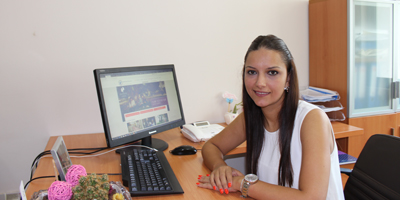EUL Academician Perçinci underlined the Importance of Consuming Meat properly at Muslim Feast of Sacrifices
Academician of European University of Lefke (EUL) Faculty of Health Sciences Department of Nutrition and Dietetics made some statements about consuming meat properly at the Muslim Feast of Sacrifices and conveyed detailed information.
Perçinci: Excessive meat should not be consumed during the Muslim Feast of Sacrifices
Perçinci said that “Almost all of us have begun a holiday rush. Where we can spend, what we can do while programming such plans, all these plans are planned with food consumption in mind” and gave some tips. Perçinci pointed out that consuming large amounts of meat during the Muslim Feast of Sacrifices may cause many illnesses and increase existing ailments. Underlining the importance of the cooking techniques along with controlling the meat amount, Perçinci said that “Cook the meat with its own fat so that it is light, do not add additional oil. Meats are difficult to digest. Hardness in the meat of freshly slaughtered animals creates difficulties in both cooking and digestion, so individuals with stomach and intestinal diseases should not consume their sacrifices immediately, but after a few days in the refrigerator, boiled or cooked by grilling.
Meat should be consumed with vegetables
Perçinci said that “Meats are a source of quality protein as well as fat, various minerals (especially iron, zinc, phosphorus, magnesium) and vitamins (especially B12, B6, B1 and vitamin A). Very fatty parts of the meat should not be consumed, the animal’s internal oils should not be used to flavor the food”. Perçinci further stated that “Meat and meat products are not a food group containing pulp. Therefore, constipation may develop by consuming excessive amounts during the holidays. In order to prevent constipation and to take various antioxidants, meats must be consumed together with vegetable dishes or with vegetables”.
Perçinci also stated that “Studies on red meat consumption are quite high. Epidemiological, evidence-based studies have developed that individuals who consume red meat often cooked with unhealthy cooking techniques have an increased risk of developing colon and stomach cancer. In addition, it is known that there is an increase in blood fat and uric acid levels with consumption of fatty meat. For this reason, it is safer and recommended by experts to cook by using baking and grilling methods, provided that the frequency of red meat consumption is reduced and boiled first. It is the healthiest to consume twice a week in terms of frequency. Cooking water should not be discarded during cooking, so meat should be cooked in low water” and added that the healthiest way is not to use oil in the vegetable foods with meat.
Perçinci: The defrosting of meat after freezing is a breeding ground for some microorganisms.
Perçinci stated that “Meats should be separated into minced meat, roast beef, chop, steak and tenderloin, not into large pieces, divided into daily quantities and stored in a refrigerator bag or greasy paper in a fridge or freezer. Meats are potentially risky nutrients that can easily be spoiled, which can threaten our health” and underlined that defrosted meat should be used immediately and should not be frosted again.
Perçinci finally stated that “The meat that is going to be defrosted should be allowed to defrosted in the fridge again, not at room temperature. The meat stored in the freezer can be defrosted by placing it on top of the vegetable compartment of the fridge. Defrosting it on the heater or stove or keeping it at room temperature are inconvenient methods” and added that The preference of milky desserts instead of sherbet desserts during the holiday will facilitate digestion.

